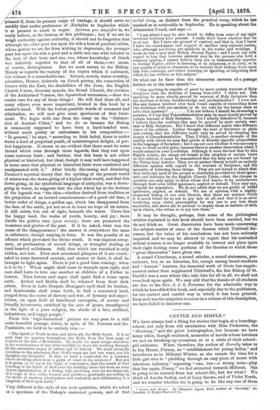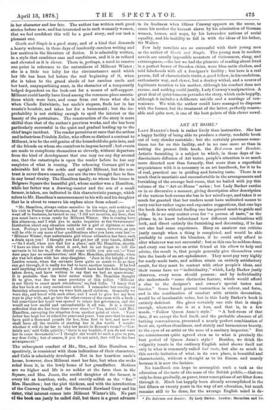GENTLE AND SIMPLE.*
we met on breaking-up occasions, or at a crisis of their school- girl existence. When, therefore, the author of Dorothy takes us to Ivy House, Putney, an "establishment for young ladies," and introduces us to Milicent Winter, as she counts the time for a little girl who is "plodding through an easy piece of music with laborious industry," repeating "one, two—a wrong note—play that bar again, Fanny," we feel attracted towards Milicent. She is going to be rescued from her school-life, but for what? We think of Amelia Sedley, and of Lucy Snowe, and of Violet North, and we wonder whether she is going to be like any one of them • Gentle and Simple. By Margaret Agues Paul, Author of "Dorothy," gm London: C. Kegan Paul and Co. WE have always had a liking for stories that begin at a boarding- school, not only from old association with Miss Pinkerton, the " dixonary," and the great lexicographer, but because we have "The Spirit of Truth is also, and above all, the Holy Spirit. It is as many other, though confused, memories of novels whose heroines such that he appears throughout the Bible, from the first page of
in her character and her fate. The author has written such good stories before now, and has interested us in such womanly women, that we feel confident this will be a good story, and our task a pleasant one. Gentle and Simple is a good story, and of a kind that demands a hearty welcome, in these days of insolently-careless writing and low motives in the literature of fiction. It is admirably written, in a style that combines ease and carefulness, and it is as refined and elevated as it is clever. There is, perhaps, a need to reserve one point in reference to the naturalness of Milicent Winter ; she is a little too lofty for the circumstances amid which her life has been led before the real beginning of it, when she is taken to the grand abode of her careless uncle and her hard, unsympathising aunt, in the character of a temporarily lodged dependent on the look-out for a means of self-support.
Milicent could hardly have lived among the common-place associa- gong which were hers, and come from out them what she is when Claude Entwhistle, her uncle's stepson, finds her in her cousin's boudoir, and takes her for a housemaid ; but the im- probability is not striking enough to spoil the interest or the beauty of the portraiture. The construction of the story is more skilful than that of the author's previous works, and she has been particularly successful in the quiet and gradual leading up to the chief #agic incident. The reader perceives at once that the artless and industrious Friiulein Zeiler, who offers so distinct a contrast to Milicent, is to be the evil genius of the household she gets into, and of the friends on whom she contrives to impose herself ; but events are made to complicate themselves so cleverly, without departure from the kind of development that one may see any day around one, that the catastrophe is upon the reader before he has any suspicion of what is coming. The scheming German girl is an admirable foil to the noble and upright Milicent, but the con- trast is never drawn coarsely, nor are the two brought face to face in any broad rivalry. The Hamilton family, to whose fine house in Belgrave Square the beautiful girl, whose mother was a Hamilton, while her father was a drawing-master and the son of a small farmer, is taken, are indicated in this characteristic passage, which refers to Mr. Hamilton's announcement to his wife and his daughter that he is about to remove his orphan niece from school :--
"Mr. Hamilton, always rather secretive in his ways, said nothing of his visit to Putney that afternoon, but on the following day, just as he went off to business, he turned to say, I did not mention, my dear, that you must have a room ready for Milicent Winter. She is coming here this afternoon, and I wish you to make inquiries at the Governesses' Institution about any situation suitable for a girl of eighteen or nine- teen. Perhaps you had better wait until she comes, however, as you will be able to say more of her qualifications after you have seen her:— 4 Milicent Winter, that unfortunate girl whose education has been such a drain upon you! I thought you had got her off your hands, Alfred.' So I shall, when you find her a place,' said Mr. Hamilton, shortly. I have no time to talk about it now, but do not forget to tell the servants to let her in, if she should come while you are out.'—' Your dear papa has no consideration,' said Mrs. Hamilton, plaintively, when she was left alone with her step-daughter. 'Just in the height of the London season, when the servants have quite as much to do as they can get through, it is really too bad to have another inmate. If he had said anything about it yesterday, I should have had the bed-hangings taken down, and have written to say that we had no spare-room.' It is probable that the brief notice which Mr. Hamilton thought
fit to give, was due to some prevision of this policy. Milicent is not likely to exact much attendance,' replied Celia. fancy that
she has been at a very second-rate school. I remember her coming on Saturday afternoons, when we were both small children. Generally we were shy, and bored with each other, and I used to give her my best toys to play with, and go into the other corner of the room with a book ; but sometimes her heart was opened to relate her grievances, and she would say bow sordid and uncomfortable it all was. It is a dreary reflection that she has been there ever since.'—' Yes, indeed,' said Mrs. Hamilton, surveying the situation from another point of view. Your father has kept her at school for years and years. lam sure that he must have paid a thousand pounds for her, from first to last, and now we shall have all the trouble of starting her in the world. I wonder whether it will do for her to take her meals in Benson's room?'—' Cer- tainly not,' said Celia quickly; there is my boudoir, if you do not want her to come downstairs.'—' I thought she would be such a gene to you, my dear Celia ; but of course, if you do not mind, that will be the best arrangement."
The subsequent conduct of Mr., Mrs., and Miss Hamilton re- spectively, is consistent with these indications of their characters, and Celia is admirably developed. Not in her heartless uncle's house, however, does Milicent meet her fate, but when she seeks relief from it, in the lowly home of her grandfather. Motives are no higher and life is no nobler at the farm than in the Square, and Mrs. Jones, the sordid daughter of the farmer, is every bit as heartless, rude, and overtly selfish as the " fine " Mrs. Hamilton ; but the plot thickens, and with the introduction
of the Conway family, and the Reverend Rowland Grey and his siater, vital interest comes into Milicent Winter's life. No part of the book can justly be called dull, but there is a great advance
in its liveliness when Oliver Conway appears on the scene, to cause his mother the keenest alarm by his admiration of German women, homes, and ways, by his heterodox notions of social equality, and his inability to fall in with the ideas of his father, Sir Walter.
Few lady novelists are so successful with their young men as the author of Gentle and Simple. The young men in modern novels are usually impossible monsters of viciousness, slang, and extravagance,—the last we had the pleasure of reading about lived in a perfect bower of Dresden china, wore blue-satin clothes, and told falsehoods with all a foreigner's facility ; but here is a real person, full of characteristic traits, a good fellow, in his credulous, enthusiastic way, and clever, but a donkey withal, and a source of legitimate vexation to his mother, although his conduct does not excuse, and nothing could justify, Lady Conway's malpractices. A great deal of quiet humour pervades the story, which ends happily, although it includes a deliberate suicide and a marriage of con- venience. We wish the author could have managed to dispense with the former, but the treatment of the latter, perfectly reason- able and quite new, is one of the best points of this clever novei.



































 Previous page
Previous page